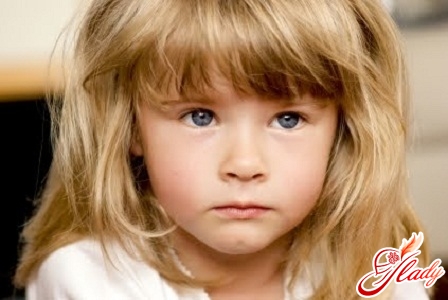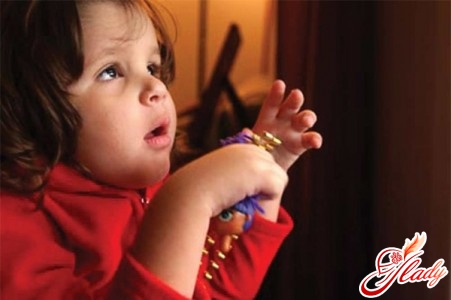 Autism.All parents without exception have probably heard about this phenomenon, but until the problem affects them personally, hardly anyone will go into details: autism, what is it? However, unfortunately, this problem has been encountered more and more often lately, and it is still too early to find accessible information that will be understandable to parents who do not have a medical education. This article is intended for these parents. It briefly but clearly describes all the symptoms and deviations in the child's behavior that are characteristic of the disorder, as well as the basic principles of working with such a group of children. Do not forget that the intensity or degree of severity of a particular disorder can be completely different in different children. But, nevertheless, there are certain common difficulties.
Autism.All parents without exception have probably heard about this phenomenon, but until the problem affects them personally, hardly anyone will go into details: autism, what is it? However, unfortunately, this problem has been encountered more and more often lately, and it is still too early to find accessible information that will be understandable to parents who do not have a medical education. This article is intended for these parents. It briefly but clearly describes all the symptoms and deviations in the child's behavior that are characteristic of the disorder, as well as the basic principles of working with such a group of children. Do not forget that the intensity or degree of severity of a particular disorder can be completely different in different children. But, nevertheless, there are certain common difficulties.
Social relationships
The first and main sign of this autismis a violation of the child's ability to interact with society, and even just communicate, often even with their parents. Such problems consist of various small nuances. For example, it is extremely difficult for such children to master even the simplest, almost innate, skills of non-verbal communication - eye contact, body position and facial expressions. Such children even visually stand out very much from the general mass of children. In addition, very often, in almost all cases, parents and teachers working with such children note the fact that a child suffering from the disease cannot establish contact with his peers, and there is no need to talk about friendly relations at all. And the children themselves try to avoid communication with such a strange, in their opinion, child, whose behavior is absolutely incomprehensible to them, due to his age. In addition, very often teachers can suspect a disorder in a child, based on observations of his behavior. As a rule, such children are absolutely unable to empathize, and will calmly step over a peer who has fallen and is crying in pain, without paying the slightest attention to him. But you should not think that the child does this out of spite, in fact, everything is very simple - it is extremely difficult, and sometimes even impossible, for children suffering from a disorder to understand and comprehend the experiences and feelings of all other people. No less significant indicator of the presence of autism is the child's speech. If a child suffers from autism, he begins to talk much later than his peers, and often never begins to talk at all. Doctors say that approximately 45% of all children suffering from autism will never learn to talk at all. But even if the child learns to talk, it will be extremely difficult for him to conduct a dialogue. Maintaining any conversation is a real feat on the part of a child suffering from autism. And on the part of adults, such a conversation requires a lot of patience, tact and understanding of the peculiarities of the psyche of such children. In addition, children with autism are characterized by extremely stereotypical and monotonous use of language. For example, a child may suffer from such a disorder as echolachia - constant repetition of the same phrase or meaningless phrase heard by him and for some reason, understandable only to him, memorized them. In addition, another extremely serious obstacle to normal dialogue is the extremely difficult understanding of the interlocutor. For example, children with autism are practically unable to understand that their interlocutor can joke during a conversation. Everything he says is understood too literally, and the child simply does not understand the hidden meaning due to his illness.
- Features of concentration of the child's attention
It is very typical for children with autisma very unusual concentration on certain parts of a whole. This is especially typical for small children - for example, instead of playing with a doll, a child may play only with its hands or dress. Strictly speaking, the same tendency can often be seen in the behavior of older children - children are extremely fascinated by strictly defined topics - some video games, car wheels or cards. Incidentally, an acute need for stability and monotony is an obligatory companion of all cases of autism. The child performs all his actions in a strict, habitual order - for example, he always bites bread first, and only then puts a spoonful of soup in his mouth, or first puts on his shoes, and only then - a hat. And even the road to kindergarten or school should be strictly defined - along the same route.
The earliest symptoms of the disease
As a rule, despite the fact that thisthe disease is a congenital disorder, it is almost impossible to diagnose it in infancy. But it is the parents or other adults who care for such a baby who may suspect autism, the symptoms of which are described below. As a rule, parents first begin to worry when they discover that their baby does not like to be hugged and resists these actions in every possible way. Later, parents may notice that the child does not show any interest in games that babies always like, for example, peek-a-boo. These oddities are especially often noticed by those parents who already have an older child and have a rough idea of how the child's growing up period should proceed. In addition, the baby's speech and hearing often become a reason for concern and contacting a doctor. The child may, in the opinion of the parents, hear general sounds very poorly, but some - for example, the sound of a vacuum cleaner or a car horn, they hear perfectly. And sometimes quite strange things happen with speech, from the parents’ point of view – the child, it would seem, has learned to talk, but suddenly, for no apparent reason, he falls silent, and it is impossible to get a single word out of him. It is very important, having noticed these symptoms, not to brush them off, naively believing that the problem will go away on its own. And it is also unreasonable to attribute all these oddities to the individual characteristics of the child’s character. In this case, the only correct decision will be to contact a doctor who can provide your child with the professional help he needs. Numerous observations of doctors – pediatricians and child psychologists indicate that timely intensive treatment of such children suffering from autism brings extremely effective results. Despite the very widespread misconception that a child suffering from autism is doomed to spend his entire life in his own world and, accordingly, in complete isolation from society, such cases are extremely, extremely rare. And the sooner the disease is detected and the appropriate corrective treatment is started, the higher the child’s chances of living a full life.
Symptoms of the disease in adolescents
It's quite rare, but still there are suchsituations in which signs of autism appear only in adolescence. And those children whose diagnosis was known long ago, in adolescence can experience much more problems than before. Despite the fact that the majority of children suffering from autism, by adolescence already have a huge store of knowledge, skills and abilities, the problem with communication still remains - it is extremely difficult for a child to express his thoughts, as well as to perceive and comprehend the thoughts of the interlocutor. In addition, parents should not forget about the fact that it is in adolescence that the process of puberty actively occurs. And the presence of autism in a child in no way cancels the hormonal changes in his body. This period of life is extremely difficult even for healthy teenagers, and what can we say about children who suffer from autism. A huge amount of patience and endurance will be required from parents during this period - after all, their help is extremely important for a child suffering from autism. Such "special" teenagers during puberty require special attention from child psychologists and doctors. It is at this age that a teenager suffering from autism often has a very high risk of developing problems associated with various fears and phobias, irritability, aggression and depression. And solving possible problems in this group of children is a much more complex and lengthy process than in healthy teenagers. That is why it is extremely important to notice the problem in a timely manner and immediately take the necessary measures.
Sensory-integrative dysfunction
Almost all children suffering from thisdisorder, are faced with sensory-integrative dysfunction. This disorder is characterized by the fact that the sick child is unable to properly process the information that comes into his brain during sensory stimulation. This type of disorder manifests itself quite specifically.
- The child either very quickly begins to experience a feeling of fatigue, or, on the contrary, is in continuous motion. Most often these two states alternate.
- When you touch this child, he shudders, as if frightened of anything.
- Children may experience hypersensitivity to various odors.
- An increased demand is made for those materials from which their clothes are sewn, agreeing to wear only one that is made of very soft and delicate fabric.
- The spirit does not tolerate stained hands.
- Some children can be extremely clumsy and clumsy.
- Almost all children with these disorders have an extremely irregular posture.
- The fine motor skills of such children are also extremely badly developed - they handle with great difficulty small objects - buttons, laces, small toys.
- They also have a very high sensitivity to sound. Some children, with the sound, for example, of a vacuum cleaner or a hair dryer, are able to fall into a real hysterics, so much so that he irritates them.
Treatment of the disease
Treatment of autism is quite complex andcomplex process. In the treatment of a child, both the drug component and the work of children's teachers and psychologists are equally important. And a very difficult task falls on the shoulders of the parents - their participation plays no less, and perhaps even more, role. The main task of parents is to very strictly follow all the recommendations and appointments of both the attending physicians and children's teachers. You should not refuse to visit the child to various institutions specializing in working with such children. The results often amaze even the most skeptical parents. And all parents should remember the most important component of successful treatment - love. Believe me, despite the fact that your baby is "special", he needs your love, understanding and support no less than other children. And sometimes even much more. After all, it is you, the parents, who will become his main support and support in such a difficult process for the child - the process of growing up and adapting to the reality around us. We advise you to read:









